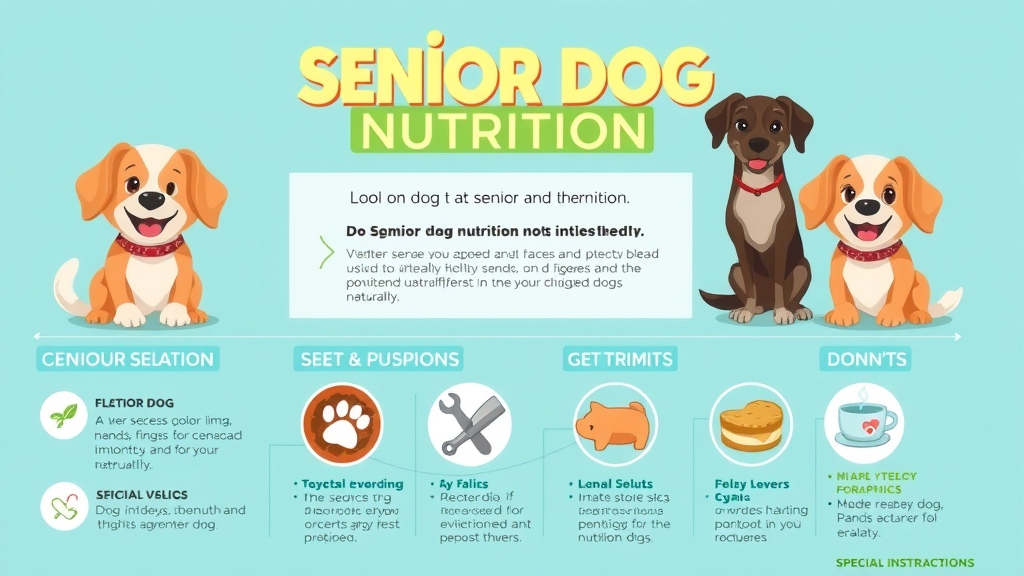Did you know that nearly 45% of senior dogs experience nutritional deficiencies? This eye-opening statistic sheds light on a common but often overlooked challenge: meeting the changing dietary needs of our beloved aging companions. If you’re aiming to give your senior dog more energy, sharper mental faculties, and a healthier, happier life, understanding and applying the principles of aging dog nutrition is essential. Whether your dog is slowing down, developing arthritis, or facing age-related decline, this guide reveals science-backed strategies for boosting your older dog’s vitality and quality of life.
How Prioritizing Aging Dog Nutrition Can Transform Your Senior Dog's Life
- Recent studies reveal that up to 45% of senior dogs suffer from nutritional deficiencies—proving the critical importance of tailored aging dog nutrition. This comprehensive guide demystifies senior dog diet and provides actionable strategies for boosting vitality in older dogs.

Senior dogs aren’t just older versions of their adult selves; their bodies are undergoing profound changes. As dogs age , their energy requirements shift, risk for chronic illnesses increases, and absorption of key nutrients can decline. Aging dog nutrition is more than just “feeding less”—it involves a careful balance of macronutrients, tailored supplementation, and ingredient quality. By focusing on a specialized senior dog diet , you can help maintain lean body mass, prevent weight gain, manage chronic conditions like arthritis and kidney disease, and even reduce cognitive decline. The right dog food and feeding strategies can quite literally add years—and life—to your dog’s golden years.
What You Will Gain from Mastering Aging Dog Nutrition
- Understanding the evolving nutritional needs of senior dogs
- How to select the best senior dog food for your aging companion
- Strategies to support dogs with arthritis and prevent age-related decline
- Essential nutrients, supplements, and practical feeding tips
- Evidence-based insights from veterinary nutritionists
By the end of this guide, you’ll have the tools to choose the right senior dog food , recognize signs your older dog needs a nutritional overhaul, and implement feeding routines that support optimal health. You’ll also learn to select targeted supplements and navigate the world of prescription diets, all while keeping your senior dog’s unique needs front and center.
Defining Aging Dog Nutrition: Why Senior Dog Diets Matter More Than Ever
Key Differences Between Adult and Senior Dog Food
- Contrast senior dog food with standard dog food, considering body condition and life stage. Highlight protein, fatty acids, and caloric requirements supported by current research.
The transition from adult dog food to senior dog food marks a crucial turning point in your canine companion’s health. Unlike adults, senior dogs require more protein to support lean body mass and offset muscle loss, while their caloric needs typically decrease to prevent weight gain as metabolism slows. Research consistently shows that higher-quality proteins, specific fatty acids (especially EPA and DHA from fish oil ), and antioxidants are cornerstone nutrients in any well-balanced senior dog diet .
"Tailored senior dog diets can add quality and years to your pet's life." – Dr. Linda Case, canine nutrition expert

One critical difference is in fatty acid content; senior dog foods often boost levels of omega-3s, while also lowering fat and calories to minimize obesity risk and support joint health. Enhanced antioxidant levels combat cellular aging, while optimized minerals address issues like declining kidney function and cognitive decline. Understanding these distinctions is vital for ensuring your dog’s body condition stays optimal during the senior years.
Identifying When Your Dog Needs an Aging Dog Nutrition Plan
Recognizing Life Stage: Signs Your Dog Is a Senior Dog
- Age range, breed specifics, and behavioral cues. Emphasize when to shift to a senior dog diet for optimal health.
Knowing when to switch to a senior dog diet is critical. Typically, dogs enter their senior years between the ages of 7 and 10, but this varies by breed and size—large breeds age faster, while smaller breeds may not show senior traits until age 10 or above. Watch for subtle changes: reduced activity, increased napping, stiff or slow movement, duller coats, or shifts in appetite. These behavioral cues signal your aging dog may require a nutritional overhaul designed for the life stage they’ve entered.
Additionally, pay attention to body condition. If your older dog struggles to maintain a lean body despite regular meals, or if you notice weight gain without dietary changes, their metabolism and digestive efficiency may be changing due to aging. At this point, consult with your veterinarian and consider making the switch to senior dog food that matches their evolving body condition and life stage needs.
Core Nutritional Needs for Aging Dog Nutrition
Essential Nutrients for Senior Dogs
- Role of protein, decreased calories, vitamin and mineral requirements, and optimal ratios of fatty acids for cognitive and joint function.
The cornerstone of aging dog nutrition lies in understanding and addressing your dog’s unique nutrient requirements as they age. Maintaining lean body mass with increased, high-quality protein is crucial to offset muscle loss. However, overall caloric intake typically needs to be lower to avoid weight gain, since aging slows metabolism and decreases energy requirements .
Critical nutrients to look for include:
- Proteins: Essential for tissue repair, immunity, and muscle maintenance.
- Fatty acids (omega-3s and omega-6s): Support cognitive health and joint lubrication—vital for dogs with arthritis .
- Antioxidants: Defend against cellular aging and promote immune system resilience.
- Vitamins & Minerals: Tailored ratios of A, D, E, B vitamins plus calcium, phosphorus, and potassium for bone, kidney, and cognitive health.
| Nutrient | Adult Dog Food | Senior Dog Food | Prescription Diet * |
|---|---|---|---|
| Protein (%) | 18-25 | 22-32 | 22-35 (disease-specific) |
| Fat (%) | 8-15 | 7-12 | 5-12 (weight/kidney focus) |
| Carbohydrates (%) | 30-50 | 30-45 | 20-45 |
| Omega-3s (mg/kg) | ~300 | 500–900 | 900+ (cognitive/arthritis care) |
| Antioxidants | Moderate | Elevated | Elevated |
Choosing the Right Senior Dog Food: Practical Guidance for Aging Dog Nutrition
Critical Ingredients in High-Quality Senior Dog Food
- Value of lean proteins, omega-3 fatty acids, fiber, and antioxidants in the dog diet.
Selecting the right senior dog food starts with prioritizing key ingredients that support the unique needs of senior dogs . Look for lean animal-based proteins as the primary ingredient, which help maintain lean body mass and muscle strength. Omega-3 fatty acids —particularly from fish oil (EPA and DHA)—are critical in reducing inflammation, supporting heart health, and enhancing cognitive function.
A high-quality senior dog diet should also incorporate:
- Soluble and insoluble fiber for digestive regularity and weight management
- Antioxidants (like vitamin E and beta-carotene) for cellular protection
- Low sodium and phosphorus to support organ (especially kidney) health
- Balanced minerals for bone and metabolic support

Always read the ingredient list and choose foods that avoid unnecessary fillers, excessive sodium, or artificial preservatives. These diet tweaks can make a profound difference in your aging companion’s energy, movement, and overall health.
Prescription Diets vs. Commercial Senior Dog Food
- When to consider prescription diet, role in managing conditions like obesity, arthritis, and chronic kidney disease.
For some older dogs facing chronic conditions—such as dogs with arthritis, kidney disease, or advanced obesity—a prescription diet may be recommended by your veterinarian. These diets are formulated to address specific medical needs: restricting sodium and phosphorus for kidney disease, enhancing fatty acid content for joint support, or providing extra fiber to regulate blood sugar and weight.
Commercial senior dog foods , by contrast, are balanced for a typical aging process, focusing on generalized maintenance and prevention. While excellent for most senior dogs , they may fall short for pets with complex medical histories or targeted dietary requirements. Always consult your vet to determine if a prescription diet is the right fit.
Addressing Unique Health Concerns in Aging Dog Nutrition
Nutritional Support for Dogs with Arthritis and Mobility Issues
- Critical role of specific fatty acids such as fish oil and joint supplements in senior dog diet.
As dogs age , arthritis and mobility challenges are among the most common quality-of-life concerns. Dietary interventions can make a real difference. Omega-3 fatty acids —most notably those found in cold-water fish oil —play an essential role in reducing inflammation and lubricating stiff joints in dogs with arthritis . Supplements like glucosamine and chondroitin help repair cartilage and improve joint function, while maintaining a lean body helps to alleviate pain associated with movement.
"Proper nutrition, especially omega-3 fatty acids, can help alleviate arthritis symptoms in older dogs." – Dr. Karen Becker, holistic veterinarian
Adjust your senior dog diet to incorporate these vital nutrients. Consider supplementing with approved joint-health formulas, and consult your vet for advanced arthritis management, which may include transitioning to a therapeutic prescription diet if needed. Monitoring body condition and providing consistent, gentle exercise further supports mobility.
Cognitive Function and Fatty Acids in Senior Dog Health
- Links between fish oil, antioxidants, and reduced cognitive decline in senior dogs.
Aging also affects cognitive function , with many senior dogs experiencing memory or behavioral changes akin to dementia. The right combination of nutrients can help slow or mitigate these effects. Research points to fish oil-derived docosahexaenoic acid (DHA) and other omega-3 fatty acids as key players in supporting brain health and maintaining alertness in older pets.

Antioxidants like vitamin E, C, beta-carotene, and selenium are also vital, as they help prevent neural degeneration and oxidative damage that accompany aging. Regularly rotating diets to match your dog’s evolving needs ensures their cognitive function is supported well into their senior years.
Practical Feeding Strategies for a Senior Dog Diet
Portion Control, Meal Frequency, and Body Condition Monitoring
- Adjusting meal size, regular body condition checks, and the importance of consistency in the senior dog diet.
Too much or too little food can negatively affect your aging dog . Senior pets often require more frequent but smaller meals to prevent digestive upset and regulate blood sugar. Portion control is crucial: overfeeding leads to weight gain and joint stress, while underfeeding can cause malnutrition and muscle loss. To optimize your senior dog diet , regularly assess your pet's body condition using both visual cues and feel—ribs should be palpable but not protruding, and abdominal tuck should remain visible.
Consistency is paramount. Stick to feeding routines, adjust portions based on activity level and life stage, and monitor for any change in appetite, weight, or mood. Quick intervention at the first sign of trouble keeps your senior dog on track toward a healthy, vibrant aging process.
Transitioning to Aging Dog Nutrition: Step-by-Step Process
- How to gradually shift the dog diet without gastrointestinal upset, and signs of a successful transition.
Transitioning an older dog to a new senior dog food should be a gradual, carefully monitored process. Sudden changes can cause gastrointestinal upset, so blend the new food into the old diet over 7-10 days, gradually increasing the new food’s proportion. Monitor for loose stools, flatulence, or decreased appetite, which can indicate a need to slow the transition. Signs of successful change include a shiny coat, stable body condition, consistent energy, and enthusiasm for meals.
Supplements for Aging Dog Nutrition: Evidence & Recommendations
Role of Vitamins, Minerals, and Fatty Acid Supplements
- Best supplements for cognitive, joint, and immune health in the senior dog diet. Analysis of evidence supporting use of fish oil, glucosamine, chondroitin, and probiotics.
As dogs progress into their senior years, dietary supplements can provide extra support where their dog food alone may fall short. For joint health, glucosamine and chondroitin are essential building blocks shown to slow cartilage breakdown, particularly beneficial for dogs with arthritis . Fish oil provides EPA and DHA fatty acids —shown to benefit both joint mobility and cognitive function. Tailored multivitamins, specifically those high in antioxidants and B vitamins, can help fortify immune defense and overall well-being.
Emerging research also highlights the benefits of probiotics for digestive regularity and immune support, and vitamin E for brain health. Always introduce new supplements one at a time, monitor for allergies or digestive changes, and consult your vet for dosing, especially if your pet is on a prescription diet for kidney or liver health.
| Supplement | Primary Benefit | How It Works |
|---|---|---|
| Fish Oil (EPA/DHA) | Joint & Brain Health | Reduces inflammation, supports cognitive function, and improves mobility |
| Glucosamine & Chondroitin | Joint Support | Strengthens cartilage and decreases arthritis discomfort |
| Probiotics | Digestive & Immune Health | Balances gut bacteria for regular digestion and reduced infection risk |
| Vitamin E & C | Antioxidant & Cognitive Support | Protects cells from oxidative stress and slows mental decline |
| L-Carnitine | Fat Metabolism | Enhances fatty acid utilization and maintains lean body mass |

People Also Ask: Aging Dog Nutrition Frequently Answered
What should I feed my aging dog?
- Select senior dog food rich in protein, moderate fat, and supplemented with antioxidants and omega-3 fatty acids. Consult with your veterinarian to determine the best dog food for your pet's unique needs.
What is the best supplement for aging dogs?
- Popular choices include fish oil for fatty acids, glucosamine and chondroitin for joint health, and tailored multivitamins. Always discuss with your vet before starting any supplement.
What are the nutritional requirements for a senior dog?
- Senior dogs need lower calories, higher protein, digestible carbohydrates, enhanced fiber, and essential fatty acids. Adjust the dog diet for body condition and specific health concerns.
What to feed my 15 year old dog?
- Choose high-quality senior dog food, possibly a prescription diet if your older dog has health issues, and prioritize hydration and easily digestible ingredients.
Best Practices for Ensuring Optimal Aging Dog Nutrition
- Arrange annual veterinary checkups to review senior dog diet
- Monitor weight, body condition, and activity levels in older dogs
- Adapt dog diet and supplements as needs change with life stage
- Engage your senior dog with activity and enrichment
Quick Reference: Aging Dog Nutrition Do’s & Don’ts
- Do: consult your vet, measure meals, provide joint support, ensure hydration.
- Don’t: feed table scraps, skip regular monitoring, overlook sudden changes in appetite or weight.

FAQs on Aging Dog Nutrition and Senior Dog Diet Optimization
- How often should I adjust my senior dog’s diet? Revisit your senior dog's diet at least annually or whenever your dog experiences weight, appetite, or activity changes. Some medical conditions may require more frequent adjustments, guided by your veterinarian.
- Can my senior dog eat the same food as my adult dog? Senior dogs have lower energy requirements, distinct nutrient needs, and may benefit from different protein, fat, and nutrient levels. Feeding a diet specific to their life stage helps prevent chronic disease and supports a healthy aging process.
- Are grain-free diets best for older dogs? Not necessarily. There is no consistent evidence that grain-free diets are superior for senior dogs unless your pet has a diagnosed grain allergy or intolerance. Focus on ingredient quality and nutritional balance rather than grain exclusion alone.
- What signs show my senior dog’s diet isn’t working? Look for dull coat, low energy, joint stiffness, digestive issues, weight changes, or changes in appetite. These can indicate the current dog diet is not optimal and requires review.
Elevate Your Senior Dog's Vitality with Targeted Aging Dog Nutrition
- Unlock the full potential of your aging dog’s golden years by implementing the evidence-based strategies in this guide. Consult your veterinarian, monitor your senior dog’s health, and discover the benefits of a purpose-built senior dog diet today.
Take action today: Prioritize targeted aging dog nutrition, consult your vet regularly, and watch your older dog thrive in their golden years.
To further enhance your understanding of aging dog nutrition, consider exploring the following authoritative resources:
-
“Feeding Mature and Senior Dogs” by VCA Animal Hospitals provides comprehensive insights into adjusting calorie intake, ensuring proper hydration, and balancing nutrients like protein, phosphorus, and sodium to support your senior dog’s health. ( vcahospitals.com )
-
“Choosing Food for Your Senior Dog” from Cornell University College of Veterinary Medicine offers expert advice on prioritizing protein, incorporating fatty acids, and understanding caloric needs to maintain your aging dog’s vitality. ( vet.cornell.edu )
These resources offer valuable guidance to help you tailor your senior dog’s diet for optimal health and longevity.
 Add Row
Add Row  Add
Add 








Write A Comment